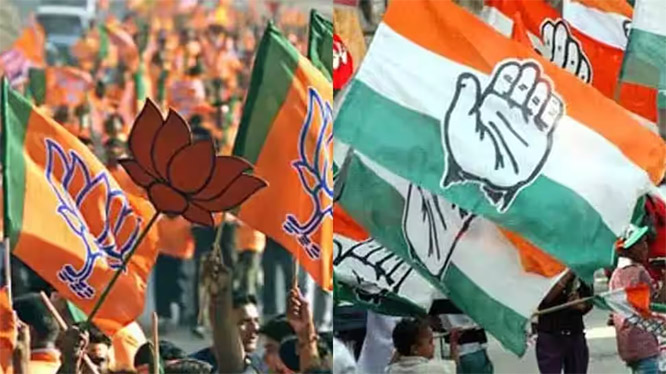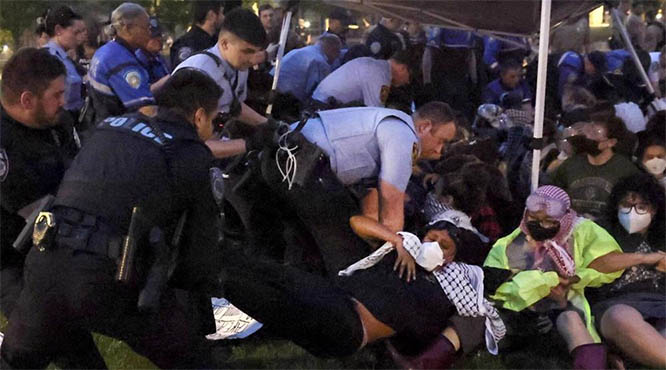Bengaluru: The Congress and BJP will lock horns on the electoral battleground again, in less than a year, in Karnataka as the stage is set for voting in the first phase in 14 Lok Sabha seats on Friday.
It's going to be a straight fight between the ruling Congress and the BJP-JD(S) combine unlike the Assembly elections in May last year which witnessed a triangular contest among the three parties.
The state has a total of 28 Lok Sabha constituencies. The second phase of polling in the remaining 14 seats is on May seven.
A total of 247 candidates -- 226 men and 21 women -- are in the fray for the first phase in most of the southern and coastal districts.
More than 2.88 crore voters are eligible to exercise their franchise in 30,602 polling stations where polling will take place between 7 am to 6 pm.
While the Congress is contesting in all 14 seats, BJP has fielded nominees in 11 and its alliance partner JD(S), which joined the National Democratic Alliance (NDA) in three -- Hassan, Mandya and Kolar.
Besides the three, the segments where elections will be held on Friday are: Udupi-Chikmagalur, Dakshina Kannada, Chitradurga, Tumkur, Mysore, Chamarajanagar, Bangalore Rural, Bangalore North, Bangalore Central, Bangalore South and Chikkballapur.
In the 2019 Lok Sabha polls, Congress and JD(S), which were in alliance and ruling the state then, had secured just one seat each in these 14 segments. The BJP had won in 11 and ensured the victory of a party supported independent candidate in Mandya.
Having scored a thumping victory in the Assembly elections, the Congress now appears determined to put up a strong show.
Karnataka is the most important state for the BJP in south India as it's only here that it had held power in the past. 'Its alliance partner JD(S) is fighting to remain politically relevant, after the Assembly poll drubbing,' a political analyst said.
The Old Mysore region is the Vokkaliga heartland and parts of it have been the traditional bastion of the JDS. However, the current elections are a battle for survival for JDS.
According to Karnataka Chief Electoral Officer Manoj Kumar Meena, 1.4 lakh polling officials will be on duty for the first phase.
Besides them, 5,000 micro-observers, 50,000 civil police personnel, 65 companies of Central Parliamentary Force and State Armed Police force of other States will also be deployed for security.
All the 2,829 polling stations of Bangalore Rural parliamentary constituency will be webcast, Meena said.
'This is as per the request of our returning officers and observers; so we have given more than double the Central parliamentary force for Bangalore Rural constituency. Seven companies of Central paramilitary forces have been inducted at the constituency since April 22,' he told reporters on Wednesday.
In fact, out of the total 30,602 polling stations in the first phase, 19,701 will be webcast, and 1,370 covered via CCTVs, he said.
Chikkaballapur has a maximum number of 29 candidates, followed by 24 in Bangalore Central, and Dakshina Kannada has the least number - nine.
JD(S) leader H D Kumaraswamy from Mandya, his brother-in-law and noted cardiologist C N Manjunath from Bangalore Rural on a BJP ticket, erstwhile Mysuru royal family scion Yaduveer Krishnadatta Chamaraja Wadiyar from Mysore, also from the BJP, and Deputy Chief Minister D K Shivakumar's brother and MP D K Suresh of Congress from Bangalore Rural, are among the prominent candidates in the fray in the first phase.
Also in the fray are BJP MP Tejasvi Surya from Bangalore South against Minister Ramalinga Reddy's daughter Sowmya Reddy of Congress, Union Minister Shobha Karandlaje on BJP ticket from Bangalore North against former IIM Bangalore professor M V Rajeev Gowda of Congress.
The Congress' performance in the elections, especially in the first phase which covers almost all Vokkaliga-dominated districts, is being seen as a big test of sorts for its state unit chief Shivakumar, who has made no secret of his ambition to become chief minister, amid speculations of change in guard mid-way of the Assembly term.
Stakes are also high for Chief Minister Siddaramaiah, as victory in particular in his home turf—Mysore and Chamarajanagar—is seen as key for strengthening hands, analysts say.
For the JD(S) and its state chief Kumaraswamy, the task is cut out -- to prove that the regional party is still a force to reckon with, particularly in the Vokkaliga dominated Old Mysuru or South Karnataka region.
Both Shivakumar and Kumaraswamy are Vokkaligas, and are engaged in a fierce turf war to consolidate their clout over the dominant community.
It is also seen as a kind of a 'litmus test' for state BJP president B Y Vijayendra, who has the onerous task of helping the party retain its supremacy in the Lok Sabha elections.
Ensuring a BJP sweep is paramount for the son of veteran leader B S Yediyurappa, to consolidate his position and silence critics who have questioned his selection for the post, overlooking seniors and seasoned hands.
The ruling Congress is mostly banking on the implementation of its populist five guarantee schemes. The BJP and JD(S) seem to be leveraging the 'Modi factor' to the hilt.








Comments
Hahahah... What a joke!!!
What these RSS Terrorists contributed for India? They supported British. If you search in history Muslims taught them everything. Even they were not knowing how to bath, how to wear clothes, how to cook, how to build buildings. All the food recipe they learnt from Muslims. These aryans run away from Iran and now looting our India. All the Buildings and culture they are using were built by Muslims. What did they build??? Toilets????
AS PER WIKIPEDIA,
The Mughal Empire (Urdu: مغلیہ سلطنت, translit. Mughliyah Salṭanat)[7] or Mogul Empire,[8] self-designated as Gurkani (Persian: گورکانیان, Gūrkāniyān, meaning "son-in-law"),[9] was an empire in the Indian subcontinent, founded in 1526. It was established and ruled by a Muslim dynasty with Turco-Mongol Chagatai roots from Central Asia,[10][11][12] but with significant Indian Rajput and Persian ancestry through marriage alliances;[13][14] only the first two Mughal emperors were fully Central Asian, while successive emperors were of predominantly Rajput and Persian ancestry.[15] The dynasty was Indo-Persian in culture,[16] combining Persianateculture[8][17] with local Indian cultural influences[16] visible in its traits and customs.[18]
The Mughal Empire at its peak extended over nearly all of the Indian subcontinent[5] and large parts of Afghanistan. It was the second largest empire to have existed in the Indian subcontinent, spanning four million square kilometres at its zenith,[4] after only the Maurya Empire, which spanned five million square kilometres. The Mughal Empire began a period of proto-industrialization,[19]and Mughal India became the world's largest economic power, with 24.4% of world GDP,[20] and the world leader in manufacturing,[21] producing 25% of global industrial output up until the 18th century.[22] The Mughal Empire is considered "India's last golden age"[23] and one of the three Islamic Gunpowder Empires (along with the Ottoman Empire and Safavid Persia).[24]
The beginning of the empire is conventionally dated to the victory by its founder Babur over Ibrahim Lodi, the last ruler of the Delhi Sultanate, in the First Battle of Panipat (1526). The Mughal emperors had roots in the Turco-Mongol Timurid dynasty of Central Asia, claiming direct descent from both Genghis Khan (founder of the Mongol Empire, through his son Chagatai Khan) and Timur (Turco-Mongol conqueror who founded the Timurid Empire). During the reign of Humayun, the successor of Babur, the empire was briefly interrupted by the Sur Empire. The "classic period" of the Mughal Empire started in 1556 with the ascension of Akbar the Great to the throne. Under the rule of Akbar and his son Jahangir, the region enjoyed economic progress as well as religious harmony, and the monarchs were interested in local religious and cultural traditions. Akbar was a successful warrior who also forged alliances with several Hindu Rajput kingdoms. Some Rajput kingdoms continued to pose a significant threat to the Mughal dominance of northwestern India, but most of them were subdued by Akbar. All Mughal emperors were Muslims; Akbar, however, propounded a syncretic religion in the latter part of his life called Dīn-i Ilāhī, as recorded in historical books like Ain-i-Akbari and Dabistān-i Mazāhib.[25]
The Mughal Empire did not try to intervene in the local societies during most of its existence, but rather balanced and pacified them through new administrative practices[26][27] and diverse and inclusive ruling elites,[28] leading to more systematic, centralised, and uniform rule.[29] Traditional and newly coherent social groups in northern and western India, such as the Marathas, the Rajputs, the Pashtuns, the Hindu Jats and the Sikhs, gained military and governing ambitions during Mughal rule, which, through collaboration or adversity, gave them both recognition and military experience.[30][31][32][33]
The reign of Shah Jahan, the fifth emperor, between 1628 and 1658 was the golden age of Mughal architecture. He erected several large monuments, the best known of which is the Taj Mahal at Agra, as well as the Moti Masjid, Agra, the Red Fort, the Jama Masjid, Delhi, and the Lahore Fort. The Mughal Empire reached the zenith of its territorial expanse during the reign of Aurangzeb and also started its terminal decline in his reign due to Maratha military resurgence under Shivaji Bhosale. During his lifetime, victories in the south expanded the Mughal Empire to its greatest extent, ruling over more than 150 million subjects, nearly one quarter of the world's population at the time, with a GDP of over $90 billion.[34][35]
By the mid-18th century, the Marathas had routed Mughal armies and won over several Mughal provinces from the Punjab to Bengal.[36] Internal dissatisfaction arose due to the weakness of the empire's administrative and economic systems, leading to its break-up and declarations of independence of its former provinces by the Nawab of Bengal, the Nawab of Awadh, the Nizam of Hyderabad and other small states. In 1739, the Mughals were crushingly defeated in the Battle of Karnal by the forces of Nader Shah, the founder of the Afsharid dynasty in Persia, and Delhi was sacked and looted, drastically accelerating their decline. During the following century Mughal power had become severely limited, and the last emperor, Bahadur Shah II, had authority over only the city of Shahjahanabad. He issued a firman supporting the Indian Rebellion of 1857 and following the defeat was therefore tried by the British East India Company for treason, imprisoned and exiled to Rangoon.[37] The last remnants of the empire were formally taken over by the British, and the Government of India Act 1858 let the British Crown formally assume direct control of India in the form of the new British Raj.
Aryan cowboys who invaded India, enslved the original inhabitants destroying their culture, imposed Vedic divisive foreign inhuman cast system. India is still suffering from their terror mindset. They are the people who supported the British and responsible for death of millions of Indian freedom fighters. These traitors who licked the British boots, now lecuring us about patriotism. When Mughals came to this land, there was no India, they built India and contributed richly to its history. If these anti-human gang cant digest the truth, let them NOT use any of the Mughal or Muslims contribution and jump into Sarayu or Ganga enmasse.
If Owais is committing intolerance, Oh Blind, deaf, dumb BJP chelas, puffets, what the hell is happening specially in UP, is it tolerance? Killing in the name of gow rakshaks, killing small children, is it tolerance?
Add new comment